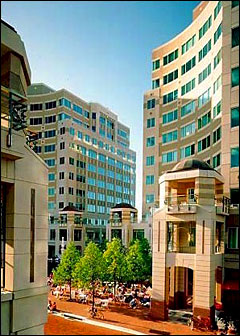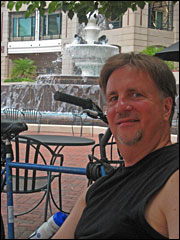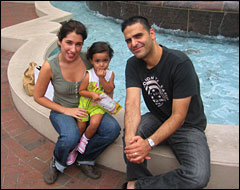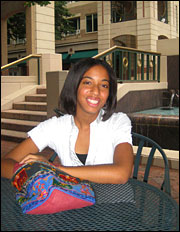This is part of a series of dispatches from Melinda Henneberger, who’s talking to voters around the U.S. about their views on the environment and the election.

Reston, Va. — If Virginia were a person, it would look a lot like Rod Markham, a federal contractor, retired from the Army, who’s leaning ever so slightly toward Obama but is still of two minds about the presidential race. “There’s a part of me that wants so bad to go for Obama,” he says, “and another part that says play it safe and go for McCain.”
The part of Virginia that wants to go Obama is here in the northern tier that includes the Washington suburbs and the booming Dulles Technology Corridor, which has replaced downtown D.C. as the region’s business center. So diverse is the area that some 100 languages are spoken at home by kids in Fairfax County public schools. The last Democrat who won this state in a presidential contest was LBJ, but Virginia’s demographics are changing so quickly that the question this year is whether Obama will win big enough in the north to offset support for McCain in the state’s much more conservative south and southwest. Turnout, especially among new voters, is expected to decide the outcome, along with swing voters like Markham, a centrist who expects to be arguing with himself right up to Election Day.
The fact that McCain was held in captivity for five and a half years in Hanoi guarantees Markham’s respect but not his vote: “Being a POW is traumatic,” so he wonders, “Is he clear and consistent in his thinking? I hope the boy is solid, but at 70, 71 …” he says, trailing off. He adds that a lot of his military buddies “want to make sure [McCain’s] mind is clear. He’s a tough guy, he’s served his country and paid his dues — he’s John McCain — but that merits a closer look. The big question in this race is, is he competent?”
His questions about Obama are just the opposite: “His lack of experience may hurt him, and his race — to some people, that’s something they can’t get past. Are we ready? That will be part of the equation. But on the flip side of that inexperience is vigor and new ideas and change” — on energy policy, among other things. Markham agrees with Obama that “you can’t drill yourself out of this mess; you’ve got to rethink how you live.”
With John Edwards’ admission that he had an affair all over the news, Markham mentions the candidates’ private lives as one unknown that could make his mind up for him: “They do seem to both be moral people, though is what you think you know about John McCain true? And could Obama be in that church he was in and not have it rub off?”
I meet Markham in Reston Town Center, where there’s a farmers market on Thursday evenings and concerts on Saturdays. Reston was founded in 1964, as part of the “new community” movement that was a forerunner of smart growth. Though you still have to take a bus to get between here and the closest D.C. Metro line, the Town Center does have an unusual amount of street life. On a weekday afternoon, people are sitting by the fountain and in outdoor cafes, reading or having coffee or, in Markham’s case, a cup of chocolate ice cream from Ben & Jerry’s down the street.

Across the square, Paul Patton and his bike are taking a little break. He’s a musician, originally from Pennsylvania, and is volunteering part-time for Obama, the first candidate who’s ever moved him to do that. Last week, they had him working a phone bank one night over the dinner hour — an assignment he did not find easy. “I’m not really outgoing, but I was able to do it,” he said, despite the weirdness of trying to keep a total stranger on the line while reading from a script and being distracted by the noise of a dozen other people reading from the same script. Patton was won over long ago, after reading Obama’s two books, and hates that the knock against his candidate is that he’s an elitist: “Average guys aren’t supposed to become president!”
One measure of how important both campaigns consider Virginia is that both candidates have Virginians on the short list of possible vice presidential nominees, with Obama considering Gov. Tim Kaine and McCain looking at Richmond Rep. Eric Cantor.
But like others I talk to here, Patton’s not that excited about the possibility of Kaine as Obama’s running mate. “They’re friends and have a lot in common, but he hasn’t been governor that long,” says Patton. “He’s not my first choice.”

Sarah and Peter Shojaie, whose 22-month-old daughter is splashing in the fountain in the square, say voting Obama is a no-brainer for them, and they talk over each other when I ask why: “On the war, on the economy …” he says, while his wife sums up this way: “No more Republicans!”
But on energy issues, says Peter, “I don’t think either one of them has a good plan” — though he figures that Obama’s has to be better than McCain’s, because “the Republicans are more aligned with the oil industry.”
Environmental and transportation issues are huge here. With one of the worst traffic problems in the country, northern Virginia has been out of compliance with federal clean-air standards for nearly 20 years — the same length of time federal and state officials have been fighting over how to fund a light-rail system. Fairfax County is so covered with concrete that there’s nowhere for water to seep into the ground; tributaries of the Chesapeake River have become narrower over the years, so flooding is a chronic problem. The drains around Reston are marked with this reminder: “No Dumping. (¡No Contamine!) Drains to Sugarland Run.” Yet the Obama supporters I talk to say these are local issues they don’t expect any president to have any say in.

Stephanie Muldrow, a student at the College of William & Mary in Williamsburg, says that both environmental issues and gay rights are front and center for her. Last year, she joined a recycling club that makes sure bins are available everywhere on campus and an environmental action club that stays in contact with elected officials. She and her friends on campus are “all young and supporting Obama.”
Because Williamsburg is in the southern part of the state, and William & Mary is known as a pretty conservative school, I’m a little surprised to hear that, though she assures me that by Virginia standards, W&M is a liberal stronghold: “Now UVA, that’s conservative.”
So, is there anybody around here who’s voting McCain? Yes, but it’s not easy being in the political minority, and when I do happen on a couple of Republicans, they decline to give their names. When I ask the woman what issues she’s interested in, she replies, “Anything John McCain says. And that’s all I have to say.”
